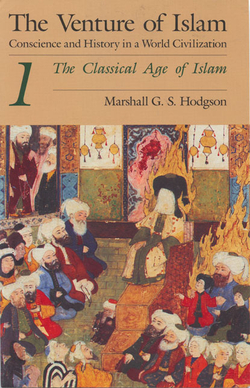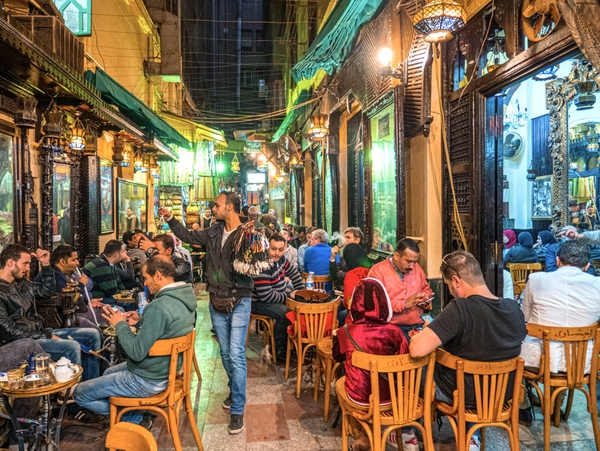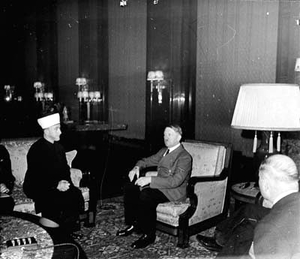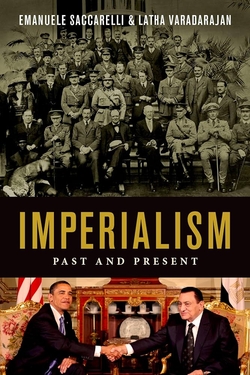Sociology of Islam: Thank you for accepting this interview. To start, where did you study Islam?
Daniel Pipes: Two years of undergraduate study at Harvard, three years in Cairo affiliated with various universities (American, Azhar, Cairo), five years of graduate study back at Harvard, interspersed with stays at other universities (Freiburg, Princeton). In 2019, on the fiftieth anniversary of my taking up the Middle East and Islam, I wrote an article about my decision to enter the field.
SoI: What are the main books that shaped your understanding of Islam and Islamism?
 University of Chicago Press, 1974. |
SoI: What is the difference between Islam and Islamism?
DP: Islam is a religion dating back 1,401 (solar) years. Islamism has three main features: a devotion to the sacred law, a rejection of Western influences, and the transformation of faith into ideology. Islamism represents a modern effort to reverse the clock and implement a medieval law code and political order. Islam brings satisfaction, Islamism brings frustration. As Islam is well known, let me dilate further on Islamism:
Islamism is an ideology that demands man's complete adherence to the sacred law of Islam and rejects as much as possible outside influence, with some exceptions (such as access to military and medical technology). It is imbued with a deep antagonism towards non-Muslims and has a particular hostility towards the West. It amounts to an effort to turn Islam, a religion and civilization, into an ideology.
The word "Islamism" is highly appropriate, for this is an "-ism" like other "-isms" such as fascism and nationalism. Islamism turns the bits and pieces within Islam that deal with politics, economics, and military affairs into a sustained and systematic program. As the leader of the Muslim Brethren put it some years ago, "Muslims are neither socialists nor capitalists; they are Muslims." I find it very telling that he compares Muslims to socialists and capitalists and not to Christians or Jews. He is saying, we are not this "-ism," we are that "-ism." Islamism offers a way of approaching and controlling state power. It openly relies on state power for coercive purposes.
Islamism is, in other words, yet another twentieth-century radical utopian scheme. Like Marxism-Leninism or fascism, it offers a way to control the state, run society, and remake the human being. It is an Islamic-flavored version of totalitarianism. The details, of course, are very different from the preceding versions, but the ultimate purpose is very similar.
Islamism is also a total transformation of traditional Islam; it serves as a vehicle of modernization. The ideology deals with the problems of urban living, of working women and others at the cutting edge, and not the traditional concerns of farmers. As Olivier Roy, the French scholar, puts it, "Rather than a reaction against the modernization of Muslim societies, Islamism is a product of it." Islamism is not a medieval program but one that responds to the stress and strains of the twentieth century.
In this, Islamism is a huge change from traditional Islam. One illustration: Whereas traditional Islam's sacred law is a personal law, a law a Muslim must follow wherever he is, Islamism tries to apply a Western-style geographic law that depends on where one lives. Take the case of Sudan, where traditionally a Christian was perfectly entitled to drink alcohol, for he is a Christian, and Islamic law applies only to Muslims. But the Islamist regime that long ruled there banned alcohol for every Sudanese. It assumed Islamic law is territorial because that is the way a Western society is run.
SoI: Do you see Islam as inherently political?
DP: Yes, and it is outstandingly the most inherently political of the world's major religions. Not only do the Koran and Hadith both contain many elements that politically instruct Muslims but their nature requires Muslims to hold political power, for instance to implement correct taxes or to fight just wars.
SoI: How about Judaism and Christianity?
DP: They are not nearly so political. Judaism makes the most interesting comparison because it and Islam are both religions of laws. But because laws concerning public life withered in Judaism, Jews can live completely observant lives without political power whereas Islamic laws about public life require Muslims to wield power to live observantly. That requirement has massive implications.
SoI: Do you see a causal correlation between European colonialism and the emergence of Islamism?
DP: Sort of. I see not colonialism specifically as the key to Islamism, but rather the general creation of modernity by Europeans is key. The extension of Europe's power around the world was one expression of that modernity but many others existed, such as in the economic, religious, and intellectual realms.
SoI: Did Islamism emerge as an ideology to resist European colonialism?
DP: No. Islam served as an ideology of resistance in many countries – Algeria, Sudan, the Caucasus, and Afghanistan come first to mind. But Islamism, or the application of the Shari'a and drive for a caliphate, emerged in places like Egypt, Iran, and India after World War I as a way to cope with the overwhelming power of Western civilization.
SoI: What is the impact of European colonialism on Muslim societies and Islam?
DP: Colonialism manifested one form of European power. As noted above, economic, religious, and intellectual power had no less importance. I like this scene-setting by Bernard Lewis in The Middle East: A Brief History of the Last 2,000 Years; he conjures up a commonplace coffee house in a country like Turkey or Egypt or Iran where men are "sitting at a table drinking a cup of coffee or tea, perhaps smoking a cigarette, reading a newspaper, playing a board game," with a radio or television playing in the corner.
Lewis then proceeds to show how nearly all its elements derive from the West. The coffee-house regulars wear Western-style clothes; their eyeglasses and watches were developed wholly in the West. Tables and chairs spread with colonialism, replacing cushions and hassocks. Tobacco comes from America. Newspapers come from Europe, as does nearly all their content, from political coverage to the comics. The same goes for radio and television, including the musical programs. Only the coffee and the board games can boast local origins.
 Cairo's famed El-Fishawy Cafe opened in 1797. |
SoI: Did the colonial experience create a deeply suspicious, even schizophrenic, mentality toward the West?
DP: Again, sort of. The challenge of modernity and the general decline of Muslim wealth and power mattered more than colonial rule. Searching for explanations for their decline in the modern era (after 1800), Muslims developed three main responses – secularism, reformism, and Islamism. Secularism holds that Muslims can only advance by emulating the West. Reformism selectively appropriates from the West in the attempt to integrate the two. Islamism, as noted above, involves a devotion to the sacred law, a rejection of Western influences, and the transformation of faith into ideology.
 Amin al-Husseini met Adolph Hitler in Berlin on Nov. 28, 1941. |
DP: Mainly by producing Amin al-Husseini as a major Islamist figure, a jihadi who absolutely rejected Zionism and aligned with the Nazis. He had a broad influence across the Middle East, from Egypt to Lebanon to Iraq.
SoI: Do you agree with the scholars who argue that the Six-Day War of 1967 spurred the radicalization of the Muslim Brotherhood?
DP: No, the Muslim Brotherhood was radical from the outset; already in 1948, for example, a Brotherhood member assassinated Egypt's prime minister. I do not perceive a significant radicalization after 1967.
SoI: How did the Zionist project impact Islamist movements?
DP: Pre-eminently, by turning Amin al-Husseini into a prominent figure. He added a hard jihadi edge.
SoI: Did religious Zionism create the model for some Islamist movements, Hamas in particular?
DP: Not at all. Islamism is a vast, worldwide phenomenon that goes back to the 1920s. Religious Zionism is a small movement in a limited space that emerged only as an important force after 1967.
SoI: How do you respond to the argument that Israel continues the Western colonial legacy?
DP: With derisive laughter. Zionism is an indigenous people's movement to return to their aboriginal land. Note this contrast: While many millions of modern Westerners emigrated to settle in the Americas, in Africa, in Australia, and parts beyond, no emigration resembled that of the Jews to Zion. Those others involved setting out to new, mostly unfamiliar places. Only Jews had maintained a remnant in their ancient, indigenous homeland despite millennia of imperial conquests and colonial settlements. Only Jews continuously immigrated to their homeland, even acquiring temporary autonomy (in Tiberias in the mid-sixteenth century) within it. Only Jews saw their destination as a land endowed with sacred attributes. Only Jews longed for the land of emigration in daily prayers, annual religious occasions ("Next year in Jerusalem"), and life-cycle events. Only Jews revived their ancient spoken language used in that land and made it the new lingua franca. Only Jews reestablished national sovereignty in their ancestral home.
One curious byproduct of the Jews' return to Zion: their economic activity spurred a parallel Muslim immigration to Palestine, mainly for jobs. Ironically, the two immigrations span roughly the same era and comprise a roughly comparable diversity of cultures.
SoI: Do you see variation between Islamist movements?
DP: Of course. The Hizmet movement of Fethullah Gülen differs in nearly every aspect from ISIS. More broadly lawful Islamists movements that work within the system differ profoundly from those that rely on criminality and violence. The former have a much greater success than the latter; contrast Recep Tayyip Erdoğan basking in a 1,150-room palace with Osama bin Laden hiding in a cave, the one a stalwart of the world's premier military alliance, the other murderously lashing out.
SoI: Speaking of Erdoğan, where does his Justice and Development Party (Adalet ve Kalkınma Partisi) fit into the larger Islamist picture?
DP: Working within the system, it shares much with other lawful Islamist movements, such as Ennahdha Party in Tunisia. I see the possibility, however tentative and remote, of such lawful Islamist parties evolving into something civilized and worthy.
SoI: Does a correlation exist between U.S. support for Israel and anti-Americanism among Muslims?
DP: Yes, among some Muslims. But relatively few Muslims make the Palestinian-Israeli conflict the center of their political universe, so it tends not to matter that much. Also, we living in the West tend to see Muslim anti-Zionism as a larger phenomenon than it is in Muslim-majority countries. That's because the Arab-Israeli conflict is fought rhetorically more viciously here.
SoI: Are you a bête noir among Middle East studies specialists? If so, why?
 Yale University Press, 2005. |
Second, I founded the Campus Watch project that critiques the failings of Middle East studies, and intensely annoys the specialists. (miriam cooke of Duke University: the "warriors" of Campus Watch "are already changing the rules of the game not only in Middle East studies but also in the US University as a whole").
Third, I personally ridicule the errors by practitioners, for example, pointing out "The Most Embarrassingly Wrong Book Ever on the Middle East" (it calls Bashar al-Assad "compassionate," "principled," "unassuming," "innocent," and "morally sound") or "Nine Errors in Three Pages" (it says I got my Ph.D. at Princeton). Just today, I had the pleasure of ridiculing an academic article that stated I founded not the Middle East Forum but the "Middle East farm."
SoI: And among Islamists?
 Oxford University Press, 2015. |
I am anti-Islamist, not anti-Islam: my slogan is "radical Islam is the problem, moderate Islam is the solution," and I make a point of not judging religions. I blame this purposeful confusion on the Council on American-Islamic Relations, which starting in 1999 worked to discredit me by mischaracterizing my views. It started with an article criticizing American Islamists that CAIR responded to by sullying my name ("Throughout his career, Pipes has exhibited bigotry toward Muslims"). It and subsequent attacks succeeded.